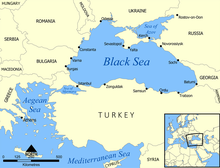The Black Sea is a sea in Eurasia between Europe, Caucasus, and Anatolia. Many important rivers flow to the Black Sea, including the Don, the Danube, the Dniester and the Dnieper.

It is connected to the Atlantic Ocean through the Bosphorus, the Sea of Marmara, the Dardanelles, the Aegean Sea, the Mediterranean Sea and the Strait of Gibraltar. The sea is divided by Crimea.
Nine tenths of the Black Sea has no oxygen. Its water is saltwater but less salty than the oceans are. During the last ice age, the Black Sea was a freshwater lake.
History
changeIn Greek mythology, the Argonauts traveled on the sea. The ancient Greeks set up colonies around the sea because it was important for them to trade during ancient history. The Gallipoli Campaign. during World War I. was a fight for access to the Black Sea, which was also an important sea during World War II.
Geology
changeThe Black Sea sits on continental plates, which have subsided. It is a geologic basin and so is a genuine inland sea.[1] It has a maximum depth of about 2000 m. The Black Sea is the world’s largest basin, and its deep waters do not mix with the upper layers of water that receive oxygen from the atmosphere. As a result, over nine tenths of the deeper Black Sea volume lacks oxygen.
The upper layers of the Black Seaare fed by large river systems and so are generally cooler, less dense and less salty than its deeper waters, which come from the warm, salty waters of the Mediterranean Sea.
Crimea is a peninsula that divides the Black Sea. The Bosporus and the Dardanelles connect the sea to the Mediterranean.
References
change- ↑ Nikishin, A (2003). "The Black Sea basin: tectonic history and Neogene–Quaternary rapid subsidence modelling". Sedimentary Geology. 156 (1–4): 149–168. Bibcode:2003SedG..156..149N. doi:10.1016/S0037-0738(02)00286-5.